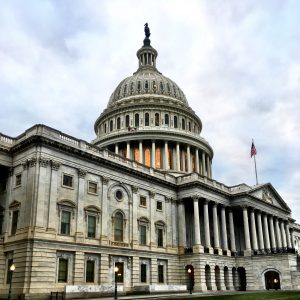
If President Trump’s tax agenda goes into effect, taxes for people of all income groups would go down next year, on average. But only a few Alaskans would get the big tax breaks.
According to a preliminary analysis by the non-partisan Tax Policy Center, most of the total tax benefit in 2027 would go to the top 1 percent — people making more than $730,000 a year. On average, they would save more than $100,000 a year in taxes in 2018, the report says. But you won’t find many of the nation’s 1-percenters in the Far North.
Economist Mouhcine Guettabi at the University of Alaska said the state has a fairly equal distribution of income, compared to other places.
“We only have about 15,000 returns or so every year that have more than $200,000 in them,” Guettabi said.
That’s fewer than 5 percent of Alaska taxpayers claiming income of more than $200,000, according to IRS data. And, at the other end of the scale, Guettabi said Alaska’s poor aren’t all that poor, thanks in part to the Permanent Fund dividend.
“That means there’s a lot of people in the middle,” Guettabi said. “And so if indeed a lot of the changes are going to negatively impact middle class Americans, then that means that there’s a larger percentage of Alaskans that are going to feel it.”
The Tax Policy Center said most households in the income range of $50,000 to $150,000 would see their taxes stay the same or drop modestly, though about one in three would see an increase.
The White House and Republican leaders in Congress unveiled their tax proposal last week. Some vital information wasn’t included, like the income levels for the tax brackets. The Tax Policy Center said it filled in some of the gaps with information from previous Republican proposals. Critics charge the think-tank’s report is based on faulty assumptions.
One thing the Republican proposal would explicitly do is eliminate deductions, such as municipal real estate taxes. Some 70,000 Alaskan property owners use that deduction to lower their federal tax bill.
Frank Sammartino, a senior fellow at the Tax Policy Center, said eliminating that deduction would have some effect in Alaska.
“Although the percentage claiming the deduction, and the average deduction that people claim, is much lower than in most states,” Sammartino said.
The vast majority of Alaskans don’t itemize. They take the standard deduction, which the Republican plan would double.
Republicans in Congress are expected to spend the next several weeks working on their budget proposal, to set the stage for their tax legislation.
But the tax plan is already having one effect in Alaska: It undercuts one of the selling points for Gov. Bill Walker’s proposed payroll tax. If Congress passes the Republican tax plan, a statewide levy like the one Walker wants would no longer be an IRS deductible.
Liz Ruskin is the Washington, D.C., correspondent at Alaska Public Media. Reach her at lruskin@alaskapublic.org. Read more about Liz here.





